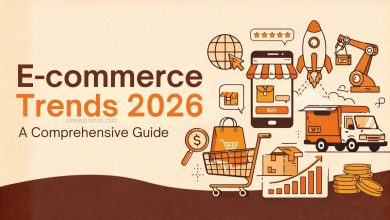Affiliate Marketing for Online Businesses – Comprehensive Guide 2025
Affiliate Marketing : Affiliate marketing has emerged as one of the most powerful and cost-effective strategies for online businesses in the digital era. With the exponential growth of e-commerce, content platforms, and social media, affiliate marketing has become a critical component of digital marketing strategies, enabling businesses to expand their reach, drive sales, and scale revenue without heavy upfront investments. As more entrepreneurs and online business owners explore sustainable ways to grow their digital presence, affiliate marketing stands out as a performance-based model that benefits both businesses and affiliates.
Table of Contents
Understanding Affiliate Marketing for Online Businesses

Affiliate marketing is a partnership-based digital strategy where businesses (advertisers or merchants) collaborate with affiliates (publishers, influencers, bloggers, or content creators) who promote their products or services through various online channels. Affiliates earn a commission when a customer purchases a product, subscribes to a service, or completes a desired action via their referral link. Unlike traditional advertising, It operates on a performance-based payment model, meaning businesses only pay when results are achieved, which makes it highly cost-effective.
For online businesses, It acts as an accelerator, allowing them to access new audiences, expand brand visibility, and build trust through third-party recommendations. Customers today are more likely to trust peer recommendations, influencer reviews, or niche content creators rather than direct advertisements, making affiliate marketing a highly efficient growth driver.
How Affiliate Marketing Works for Online Businesses
Affiliate marketing operates on a simple structure:
- Merchant/Business – The brand or online business selling the product or service.
- Affiliate/Publisher – The individual or company promoting the product in exchange for commission.
- Affiliate Network/Platform – A mediator that provides tracking, reporting, and payment solutions (examples: ShareASale, CJ Affiliate, Impact).
- Consumer – The end user who purchases based on the affiliate’s recommendation.
When an affiliate promotes a product via a unique tracking link, every sale or lead generated through that link earns them a commission.
Why Affiliate Marketing Matters for Online Businesses in 2025

As digital commerce evolves rapidly, the role of affiliate marketing has become more critical than ever. Several factors underline its significance for online businesses in 2025:
- E-commerce Expansion – The e-commerce market continues to grow globally, with millions of consumers relying on online platforms for shopping. Affiliate marketing helps businesses tap into diverse traffic sources.
- Consumer Trust – Modern consumers are wary of traditional ads but trust recommendations from influencers, bloggers, or comparison sites. It builds credibility.
- Cost Efficiency – Since payments are commission-based, businesses avoid high upfront ad costs while affiliates gain income opportunities, creating a win-win ecosystem.
- Scalability – Online businesses can scale quickly by onboarding multiple affiliates, thereby multiplying their reach.
- SEO and Content Marketing Synergy – Affiliates create content that not only drives traffic but also boosts visibility through search engine optimization.
Why Affiliate Marketing is Essential for Online Businesses in 2025
The rise of AI tools, social media platforms, and influencer-driven content has reshaped consumer behavior. Customers no longer rely solely on brand advertisements; instead, they trust authentic recommendations. Affiliate marketing bridges this gap by turning publishers and influencers into brand advocates.
Key reasons why affiliate marketing is essential for online businesses in 2025 include:
- Cost-Effectiveness – You only pay for conversions or clicks, reducing marketing risk.
- Scalability – Affiliate networks and influencers can help scale globally without upfront ad spend.
- Trust and Credibility – Affiliates act as trusted third-party voices, boosting brand reputation.
- Multi-Channel Growth – From blogs to, affiliates cover multiple platforms and audiences.
- Data-Driven Decisions – Advanced tracking tools allow businesses to analyze affiliate performance.
Also Read : How To Become a Reseller And Start Selling : A Comprehensive Guide 2025
Core Elements of Affiliate Marketing for Online Businesses
To understand how online businesses can effectively implement affiliate marketing, it is essential to examine its core elements:
1. Merchant (Advertiser/Business Owner)
The business selling a product or service. Merchants use affiliate programs to recruit partners who promote their offerings.
2. Affiliate (Publisher/Promoter)
The individual or entity promoting the product in exchange for commissions. Affiliates may include bloggers, YouTubers, influencers, or coupon/deal websites.
3. Affiliate Network/Program
Many businesses manage their affiliate relationships through dedicated platforms like CJ Affiliate, ShareASale, Impact, or in-house programs that track conversions and handle payments.
4. Consumer
The customer who ultimately makes a purchase or takes action via the affiliate’s promotional efforts.
5. Commission Model
The payment structure can vary – pay-per-sale (PPS), pay-per-click (PPC), pay-per-lead (PPL), or revenue sharing, depending on business objectives.
Benefits of Affiliate Marketing for Online Businesses
Cost-Effective Growth
Unlike paid advertising models where costs are incurred regardless of results, It ensures businesses only pay for actual sales or leads, reducing risk and improving ROI.
Increased Market Reach
Affiliates expand a business’s exposure to diverse audiences across blogs, YouTube, podcasts, and social media, capturing traffic that might be difficult to reach otherwise.
SEO and Content Boost
Affiliate-generated content drives backlinks, keyword rankings, and organic traffic, strengthening a brand’s SEO presence.
Credibility Through Influencer Partnerships
When trusted influencers or niche bloggers recommend a product, it creates an authentic connection with customers, fostering trust and loyalty.
Scalability and Flexibility
It allows businesses to expand their networks easily. A small brand can start with a few affiliates and gradually build a global network.
Affiliate Marketing Strategies for Online Businesses in 2025
Online businesses can maximize affiliate marketing by following strategic approaches that align with current digital trends:
1. Niche-Specific Affiliate Programs
Instead of casting a wide net, businesses should focus on affiliates in niche markets that align with their product. For example, a fitness supplement brand should target health bloggers, fitness influencers, and wellness YouTubers.
2. Content-Centric Promotions
High-quality content remains the cornerstone of affiliate success. Businesses should encourage affiliates to produce detailed product reviews, tutorials, comparison blogs, or listicles optimized with high-reaching keywords.
3. Leveraging Influencers and Micro-Influencers
In 2025, micro-influencers with highly engaged niche audiences are proving more effective than large influencers. Online businesses should collaborate with micro-influencers who can create authentic endorsements.
4. Affiliate Tracking and Analytics
Businesses must invest in affiliate management tools that provide insights into traffic, conversions, and ROI. This helps optimize strategies and strengthen affiliate relationships.
5. Omnichannel
Modern affiliate strategies should integrate across channels – blogs, YTube, Insta, podcasts, and newsletters – ensuring a wider impact.
6. Incentives and Bonus Structures
Offering tiered commissions, performance bonuses, or exclusive promotions motivates affiliates to prioritize promoting your brand.
7. AI-Powered
Artificial Intelligence tools help businesses analyze affiliate performance, detect fraudulent traffic, and personalize offers to boost results.
8. Mobile-First Campaigns
With most online shopping happening on mobile, affiliate campaigns must be mobile-optimized for seamless user experiences.
9. Email and Funnel Integration
Affiliates who build email lists and sales funnels can deliver higher conversion rates. Businesses can support affiliates with ready-made email templates or promotional assets.
Buy Now : Ecommerce Website
Challenges
Despite its many advantages, It also poses certain challenges for online businesses:
- Fraudulent Activities – Fake leads, cookie stuffing, and click fraud can affect ROI.
- Finding the Right Affiliates – Not all affiliates deliver genuine results; selecting quality partners is critical.
- Commission Management – Setting competitive yet sustainable commission rates is often challenging.
- Market Competition – With many businesses offering affiliate programs, standing out requires innovation.
- Regulatory Compliance – Affiliates must adhere to disclosure guidelines (e.g., FTC rules) to maintain transparency.
Future of Affiliate Marketing in Online Business

It is projected to grow stronger in the coming years, fueled by the rise of AI tools, influencer marketing, voice search, and mobile commerce. Online businesses that embrace innovation, personalization, and ethical practices in affiliate programs will enjoy long-term benefits. Trends like affiliate partnerships with AI-driven chatbots, integration with AR shopping, and blockchain for transparency are expected to redefine affiliate marketing landscapes by 2030.
Conclusion
Affiliate marketing for online businesses is not just a trend but a proven growth strategy in 2025 and beyond. Its performance-based model, scalability, and trust-driven nature make it an indispensable tool for digital entrepreneurs, startups, and established brands alike. By aligning with the right affiliates, optimizing campaigns with SEO and high-reaching keywords, and embracing innovation, businesses can create sustainable growth while affiliates enjoy lucrative earning opportunities. As consumer behavior continues to shift toward authenticity and digital-first experiences, It will remain a cornerstone of online business success.
Disclaimer: The information provided in this blog is for educational and informational purposes only. It should not be considered as financial, legal, or professional advice. Readers are encouraged to conduct their own research or consult a qualified professional before making any business or financial decisions.



